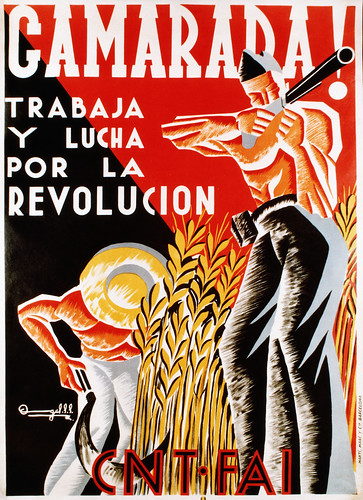
Chances are, if you've had a meaningful conversation with me in the last year or so, then the subject of Anarchism most likely came up at some point or another. It's a belief system that I've clinged strongly to over the last year and a half and it's managed to change my perception on nearly everything from family and work, to society in general.
To be more specific, I prefer to align my beliefs in the Anarcho-syndicalist side of the spectrum; meaning I prefer to envision a future in which all matters are decided upon by well-organized committees and panels that are made up of the very same people who break their backs all day long, as opposed to overly privileged old white men in suits as it's currently done in present day society.
Essentially Anarchism has become a general over-head term that's used to describe the common threads that each of it's sub-sects embody. These sub-sects range from the exclusionary Anarcho-feminists, to the oxymoronical Anarcho-capitalists (seriously how can two things that are diametrically opposed ever function side by side in a fair society).
Out of these sub-sects the one that i find the most interesting and important, yet confusing and idealistic, is Anarcho-primitivism.
Interesting because unlike most other forms of Anarchism that attacks and picks apart the system itself, Anarcho-primitvism not only attacks the system, but also picks apart the very environment that surrounds us. From the buildings and skyscrapers that tower over us, to the medicine and food that we're fed, to the ease of communication through cell towers and the internet that we're so accustomed to; even going as far as in John Zerzan's case as to criticize language itself.
Important because this sub-sect is the fastest growing within the realm of Anarchism. No surprise there since the so called "green-revolution" has been the fastest growing amidst the mainstream political sphere as well.
Idealistic (almost overly so) because of the means to an end that Anarcho-primitivists seek. Where as the revolution amongst Anarcho-syndicalists would end at the destruction of the central state, the revolution for primitivists seems to end at the destruction of the metropolis and all major cities.
Confusing, to me at least, because I've yet to read an answer to the question of how exactly they plan on achieving this means to an end. While it may be the largest growing sect of Anarchism, once the central state is eliminated we are then faced with the overwhelming majority of the country that know next to nothing about Anarchism. This majority is accustomed to the ease of communication and the grandeur and glamour of the metropolis that they inhabit. So the idea of destroying the cities and communication airwaves on the heels of the destruction of the central state, to me, wouldn't seem very appealing. So the only logical way that I can see the primitivists achieving their goal is through force over the innocent and uncooperative masses, which itself is an affront to the name of Anarchism itself.
blah blah blah blah
I don't know what the point of this post was, except to
1) get back into the blog-0-sphere
idk, we're reading John Zerzan's book for our Anarchist Book Club, and i wanted to start blogging again....so thats what this post is... also im incredibly stoned, so that explains everything that's wrong with this post.
on a side note, we're looking for a backyard/house to throw a benefit show for the Zapatistas of Chiapas, Mexico. We plan on charging at the door and selling food, and all proceeds will go to them. So if anyone knows anything message me.


2 comments:
"So the only logical way that I can see the primitivists achieving their goal is through force over the innocent and uncooperative masses, which itself is an affront to the name of Anarchism itself."
This describes Anarchism's split personality well. Many are familiar with the Dr. Jekyll side of the theory because of its loud mouth; its plainer, more contemplative side is overlooked too often. It might be because its scholars tend to stay away from the A-word and its buzz-words to avoid being associated with those types of anarchists. Proponents of the extreme types of anarchism (or anarchy) are guilty of forgetting that all political discussion requires refinement and respect, particularly in an uphill battle in the case of Anarchism. The idea of breaking down government in any shape or form is obscene to most learned folk; and it is their right to reject the notion. More often than not, persistent Anarchist attempts to recruit and inform end up harming more than helping.
You're absolutely right in saying that harming people goes against the spirit of Anarchism, which would occur in a primitivist situation even if it were achieved peacefully. I believe the same is true for alienating the masses.
The word itself is a very general term--I've heard anarcho-capitalism be referred to as Right-wing Libertarianism, and and Chomsky be called a left-wing Libertarian.
Perhaps the future of Anarchism will lie under a different name; maybe then the phrase "I'm not going to discuss that" will stop being a phrase commonly associated with Anarchism.
^ brilliantly put! Let's discuss this at the meeting for sure.
"The word itself is a very general term--I've heard anarcho-capitalism be referred to as Right-wing Libertarianism, and and Chomsky be called a left-wing Libertarian.
Perhaps the future of Anarchism will lie under a different name; maybe then the phrase "I'm not going to discuss that" will stop being a phrase commonly associated with Anarchism."
It speaks so much.
_Y
Post a Comment